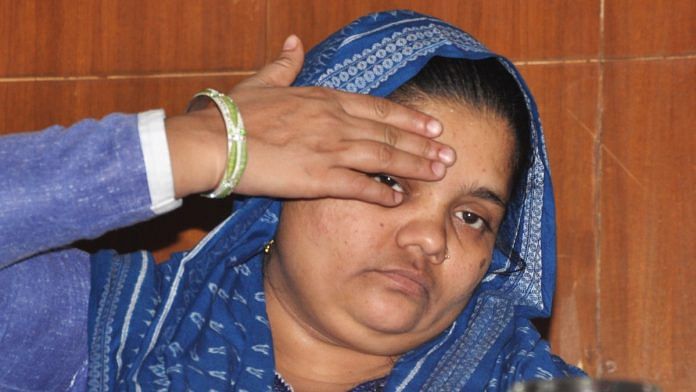New Delhi: The Supreme Court Wednesday considered arguments on whether third parties could challenge the premature release of 11 convicts in the Bilkis Bano gangrape and murder case from the 2002 Gujarat riots.
The convicts were released in August last year, after a Gujarat government panel approved their application for remission of their life sentence.
The court is hearing petitions challenging the Gujarat government’s decision by several petitioners, including CPI (M) leader Subhashini Ali, TMC MP Mahua Moitra, Professor Rooplekha Verma, journalist Revati Laul, former IPS officer Meeran Chadha Borwankar, and the National Federation of Indian Women (women’s wing of the Communist Party of India).
Bilkis Bano also challenged the remission order in the Supreme Court in November last year. She has also challenged the top court’s 13 May 2022 ruling that asked the Gujarat government to consider the convicts’ release on the basis of its 1992 policy for remission and premature release of prisoners (which was in effect at the time of conviction).
The lawyers for the convicts have raised preliminary objections with respect to maintainability of these PILs specifically, arguing that third parties cannot interfere in criminal proceedings.
The case was heard by Justice B.V. Nagarathna and Justice Ujjal Bhuyan Wednesday.
During the hearing, Additional Solicitor General S.V. Raju submitted that remission is “nothing but reduction of sentence”. He then said, “On a sentence, there cannot be a PIL.”
In response, Justice Nagarathna said this was an “administrative order”. However, Raju shot back, “But remission is a reduction of sentence … Insofar as quantum of sentence is concerned, a third party can never have a say.”
He told the court that his submissions revolve around no third party interference being allowed in criminal matters in the garb of PILs, the misuse of PILs, and the PIL petitioners being “nothing but an interlower and a busybody”.
Senior advocate Siddharth Luthra, appearing for one of the convicts, also made similar submissions.
He cited several judgments on rights of victims to participate in such proceedings, and asserted that the right of victims to participate in criminal proceedings is controlled by statute.
Luthra then submitted that third-party interference in criminal cases is not permissible.
He said that, in the context of any criminal proceedings or any collateral action arising out of any criminal proceedings, third parties cannot interfere.
The hearing will continue Thursday.
Also Read: Bilkis Bano rapists release isn’t just Hindu-Muslim issue. BJP leaders telling nobody’s safe
‘Will open floodgates’
Arguing for one of the convicts, advocate Rishi Malhotra also objected to the PILs filed by third parties in the case. He also submitted that entertaining PILs by multiple people challenging their remission will open a “Pandora’s box” and set a dangerous precedent.
However, in response, Justice Nagarathna pointed out, “There is no challenge to conviction and sentence. Here they are challenging an essentially administrative order of granting remission. Of course conviction cannot be challenged by a third party… But this is vitally different. We are in the realm of administrative law.”
When Malhotra said these PILs don’t allege any violation of public rights, Justice Nagarathna noted that PILs don’t deal with violations of the petitioner’s fundamental rights.
“It’s in public interest, not private interest,” she said, adding, “Ultimately, this is not a criminal matter. It’s an administrative order. Who can challenge an administrative order, you apply that test.”
Justice Nagarathna also gave an example, saying, “A private company is given licence by the government for an industry. Some villagers’ lands would be affected or get submerged. Now if not the villagers but a public-spirited person challenges, will it be thrown out saying your private interests are not affected when it is about the environment?”
The remission order
Bano was gangraped and several members of her family were killed by a mob at Gujarat’s Randhikpur village when they were fleeing the post-Godhra riots in March 2002. Her three-year-old daughter Saleha’s head was smashed with a rock. Bano was 19, and five months pregnant at the time.
The case was probed by the CBI on the Supreme Court’s direction.
In 2008, a trial court in Mumbai — trial was shifted outside Gujarat in 2004 on an application by Bano — convicted 13 accused for the crime, and sentenced 11 of them to life imprisonment.
This was upheld by the Bombay High Court in May 2017. In April 2019, the Supreme Court also directed the Gujarat government to give Rs 50 lakh compensation, a job and accommodation to Bano.
How remission was granted
One of the convicts, Radheshyam Bhagwandas Shah aka Lala Vakil, approached the Supreme Court in March last year, seeking a direction to the Gujarat government to consider his application for premature release. He pointed out that as of 1 April 2022, the convicts had already spent 15 years and 4 months in jail.
In response, the Gujarat government told the court that since the trial in this case concluded in Maharashtra, his application for premature release needs to be filed before the Maharashtra government. However, in a judgment passed on 13 May last year, a bench comprising Justice Ajay Rastogi and Justice Vikram Nath ruled that the crime was committed in Gujarat and since, ordinarily, the trial would’ve been conducted in Gujarat, it is the Gujarat government that should consider the application of the convicts.
The court also explained that the convicts’ application would be considered under the state government’s 1992 policy for remission and premature release of prisoners. This was because it was this policy that was in effect on the date of the conviction, and not the revised version issued in 2014.
It then directed the Gujarat government to consider Shah’s application for premature release within a period of two months, in line with the applicable remission policy.
(Edited by Sunanda Ranjan)
Also Read: Bilkis Bano case convicts controversy: Why the 11 were released under ‘old’ 1992 policy



